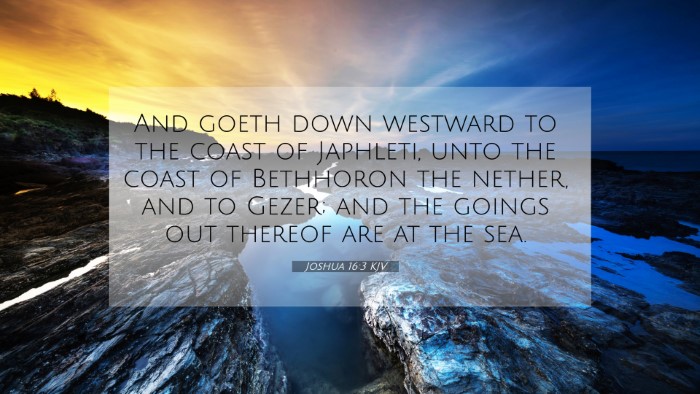Old Testament
Genesis Exodus Leviticus Numbers Deuteronomy Joshua Judges Ruth 1 Samuel 2 Samuel 1 Kings 2 Kings 1 Chronicles 2 Chronicles Ezra Nehemiah Esther Job Psalms Proverbs Ecclesiastes Song of Solomon Isaiah Jeremiah Lamentations Ezekiel Daniel Hosea Joel Amos Obadiah Jonah Micah Nahum Habakkuk Zephaniah Haggai Zechariah MalachiJoshua 16:3 Similar Verses
Joshua 16:3 Cross References
And goeth down westward to the coast of Japhleti, unto the coast of Bethhoron the nether, and to Gezer; and the goings out thereof are at the sea.
Uncover the Rich Themes and Topics of This Bible Verse
Listed below are the Bible themes associated with Joshua 16:3. We invite you to explore each theme to gain deeper insights into the Scriptures.
Joshua 16:3 Cross Reference Verses
This section features a detailed cross-reference designed to enrich your understanding of the Scriptures. Below, you will find carefully selected verses that echo the themes and teachings related to Joshua 16:3 KJV. Click on any image to explore detailed analyses of related Bible verses and uncover deeper theological insights.
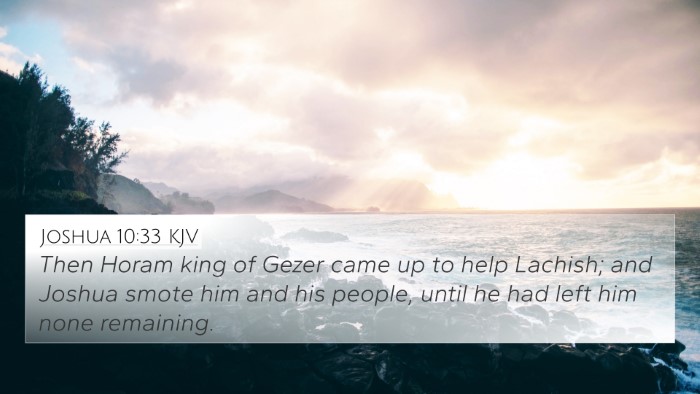
Joshua 10:33 (KJV) »
Then Horam king of Gezer came up to help Lachish; and Joshua smote him and his people, until he had left him none remaining.
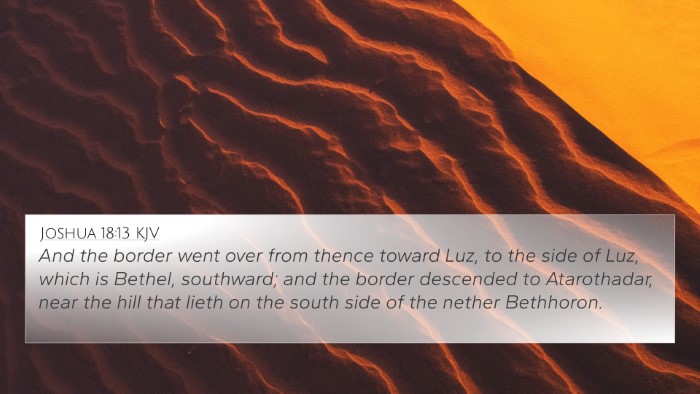
Joshua 18:13 (KJV) »
And the border went over from thence toward Luz, to the side of Luz, which is Bethel, southward; and the border descended to Atarothadar, near the hill that lieth on the south side of the nether Bethhoron.

2 Chronicles 8:5 (KJV) »
Also he built Bethhoron the upper, and Bethhoron the nether, fenced cities, with walls, gates, and bars;
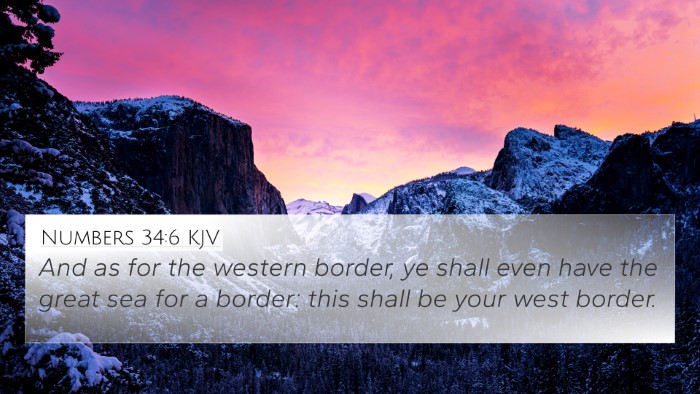
Numbers 34:6 (KJV) »
And as for the western border, ye shall even have the great sea for a border: this shall be your west border.
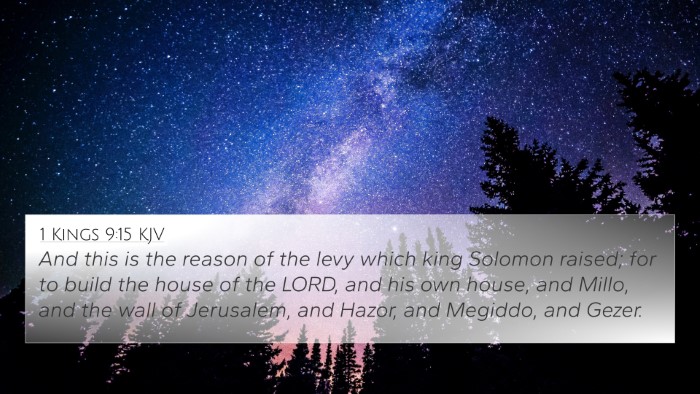
1 Kings 9:15 (KJV) »
And this is the reason of the levy which king Solomon raised; for to build the house of the LORD, and his own house, and Millo, and the wall of Jerusalem, and Hazor, and Megiddo, and Gezer.
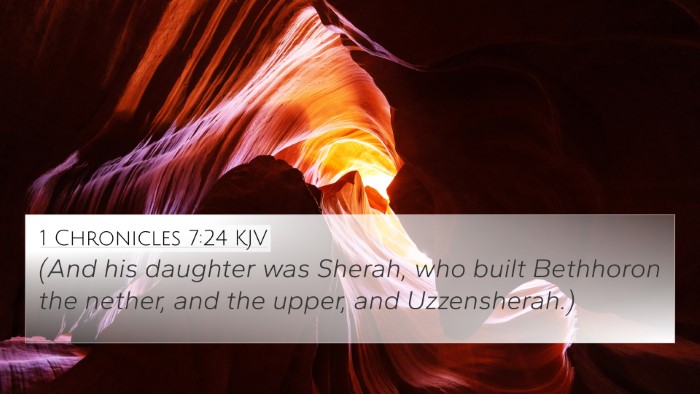
1 Chronicles 7:24 (KJV) »
(And his daughter was Sherah, who built Bethhoron the nether, and the upper, and Uzzensherah.)
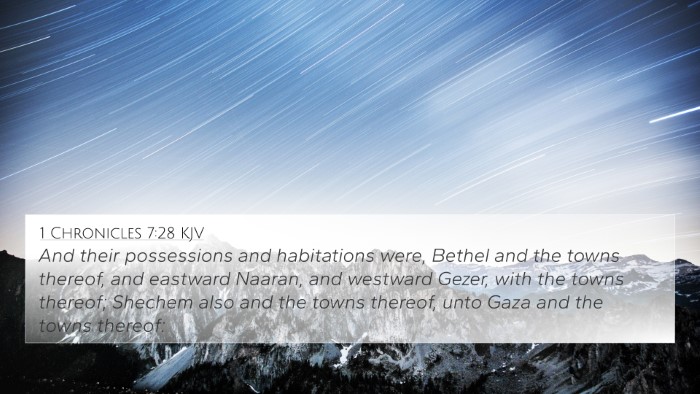
1 Chronicles 7:28 (KJV) »
And their possessions and habitations were, Bethel and the towns thereof, and eastward Naaran, and westward Gezer, with the towns thereof; Shechem also and the towns thereof, unto Gaza and the towns thereof:
Joshua 16:3 Verse Analysis and Similar Verses
Bible Verse Meaning: Joshua 16:3
Verse: Joshua 16:3 states, "And go down westward to the inhabitants of En-Tappuah." This verse is a part of the instructions given to the tribes of Israel regarding their inheritance in the Promised Land. It details the boundaries and regions that were assigned to the tribe of Ephraim.
Understanding Joshua 16:3
This verse encapsulates significant themes of God's providence, territorial inheritance, and fulfillment of promises to the Israelites. The mention of En-Tappuah indicates a specific geographical location that holds historical and spiritual relevance.
Commentary Insights
- Matthew Henry: Henry reflects on how the boundaries assigned to Ephraim signify the faithfulness of God in fulfilling His promises. The westward direction points to the broader theme of God leading His people towards their divine destiny.
- Albert Barnes: Barnes notes the strategic importance of En-Tappuah as a city. He emphasizes that the detailed delineation of the land illustrates God's meticulous planning for His people and encourages readers to recognize God's sovereignty in all aspects of life.
- Adam Clarke: Clarke interprets the instruction to go westward as a metaphor for moving towards one's spiritual inheritance. He suggests that recognizing and pursuing one’s God-given promises is essential for a successful faith journey.
Cross-References Related to Joshua 16:3
- Genesis 12:7: God's initial promise to Abraham about the land, representing the early foundations of the inheritance.
- Joshua 1:3: God's declaration to Joshua regarding the extent of the land promised to the Israelites.
- Joshua 17:14-18: A recount of the Ephraimites asking for more land and God's reassurance of their inheritance.
- 1 Chronicles 7:20-29: Describes the descendants of Ephraim and their land, showcasing God's ongoing covenant with His people.
- Numbers 34:1-15: The comprehensive description of the boundaries for the tribes of Israel, adding context to Joshua 16:3.
- Deuteronomy 12:9: Reference to the Israelites entering the Promised Land, reiterating the importance of obedience and belonging.
- Exodus 3:8: God's promise to deliver the Israelites into a land flowing with milk and honey, a precursor to the inheritance described in Joshua.
- Ephesians 1:11: A New Testament linking of believers' inheritance in Christ, drawing parallels to the Old Testament themes of land and promise.
- Hebrews 11:8-10: Highlights faith in God's promises as demonstrated by Abraham, applicable to Israel's inheritance of the land.
- Romans 8:17: Discusses believers as heirs of God, connecting with the theme of inheritance from Joshua 16:3.
Thematic Connections
The verse illustrates the connections between Bible verses, showcasing how the theme of inheritance permeates both the Old and New Testaments. Through careful comparative Bible verse analysis, we see a cohesive narrative of God's desire to dwell with His people and bless them with their rightful inheritance.
Practical Application
For modern believers, Joshua 16:3 serves as a reminder of God's faithfulness to His promises. It encourages cross-referencing Biblical texts to understand the full scope of God’s plan. Not only does it reaffirm the historical context of inheritance but emphasizes the spiritual inheritance believers receive through faith.
Using Cross-References for Deeper Understanding
Utilizing a cross-reference Bible study approach can illuminate the connections between Joshua 16:3 and other scriptures. One can employ tools like a Bible concordance or Bible cross-reference guide to discover and analyze relevant verses, deepening one’s understanding of Biblical themes and doctrines.
Conclusion
In conclusion, Joshua 16:3 presents a rich tapestry of God's promises and His meticulous planning for Israel. The insights drawn from public domain commentaries alongside extensive cross-references enhance our interpretation and understanding of the scripture, making it a valuable verse for study and meditation.


